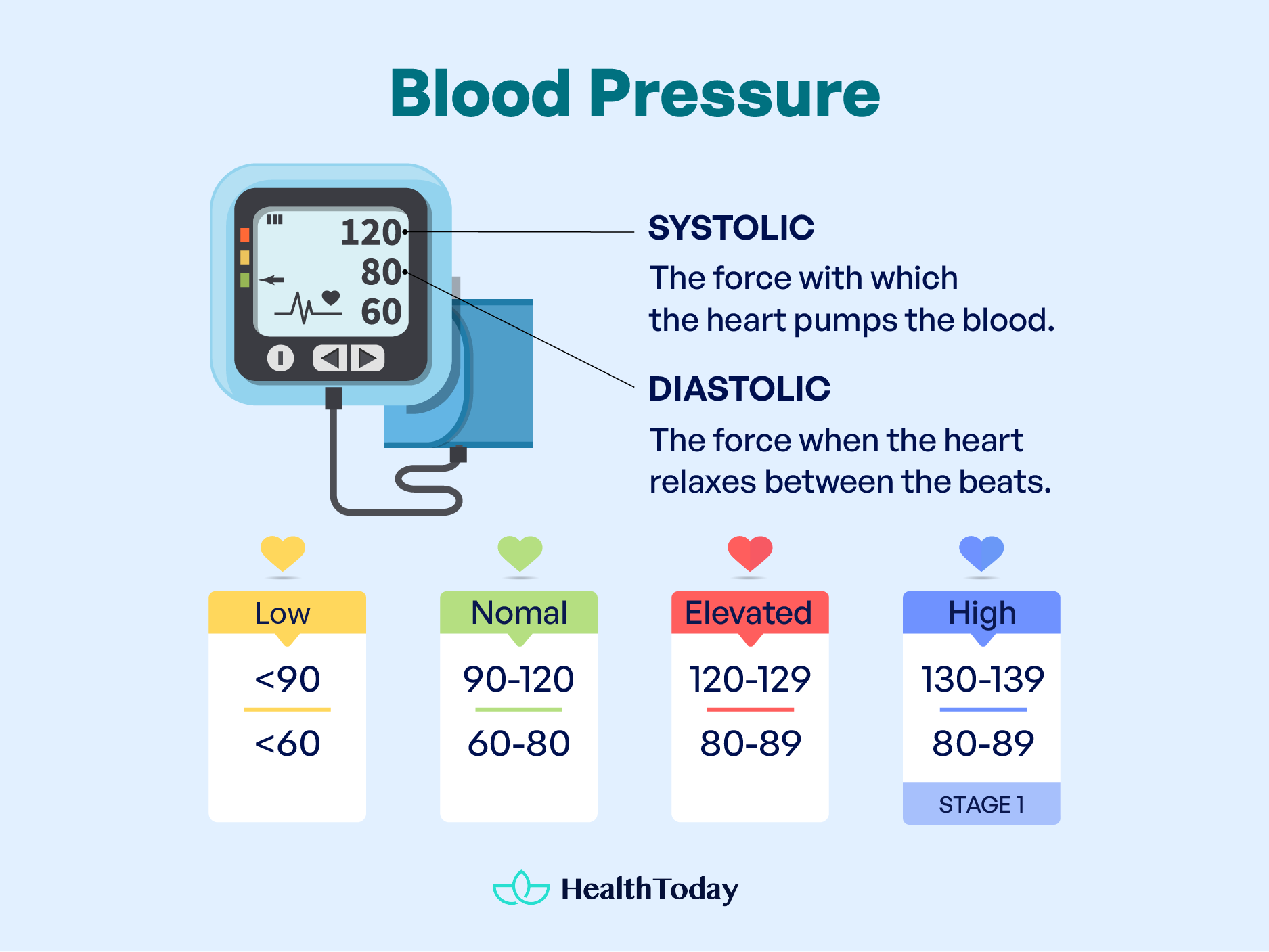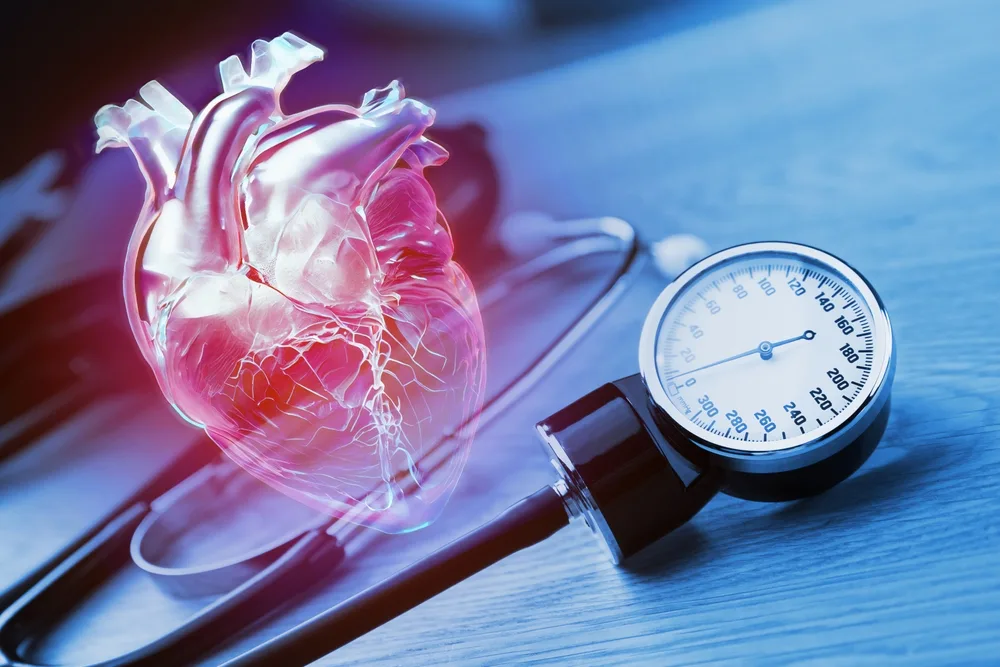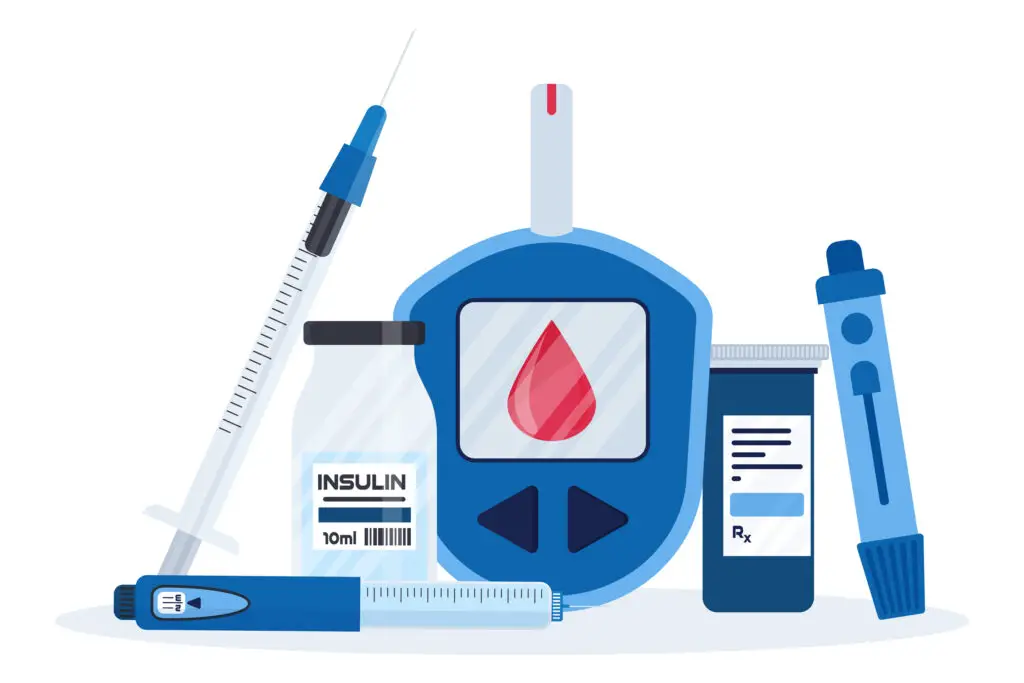Table of Contents
Everyone has heard the term high blood pressure or hypertension at least once? You might wonder what numbers you should aim for when managing your blood pressure. When should you visit a doctor? Or what 119 over 77 blood pressure means.
This article will explain the link between your heart health and blood pressure and what preventions you can take to maintain good blood pressure.
119 over 77 blood pressure: Is it good or bad?
Before discussing the meaning of 119 over 77 blood pressure numbers, we should start with what is blood pressure.
What is blood pressure?
Blood pressure is the force that your blood is applying against your blood vessels. There are two numbers: systolic and diastolic. Systolic is the force with which the heart pumps blood. Diastolic is the force when the heart relaxes between the beats (1).

According to the American Heart Association (AHA), the normal ranges are less than 120 mmHg and 80 mmHg for systolic and diastolic, respectively. Above these values, blood pressure is considered elevated (2). Thus, 119/77 mmHg blood pressure is normal and safe.
However, is there any lower limit or any value of blood pressure below 120/80mmHg that is fine? There is a lower limit, which is 90/60 mmHg. However, blood pressure should not fall below this. Ideally, it should remain between 120/80 mmHg to 90/60 mmHg (1).
So, what if we do not maintain these normal levels? Why is it dangerous if you get elevated readings?
High blood pressure is the main cause of many diseases, especially your heart can be prone to its damaging effects. Abnormal blood pressure mostly affects three organs— the kidneys, heart, and brain (3).
There is a slight variation in blood pressure readings when it comes to males and females. Males have a hormone named testosterone, which is responsible for slight variations in blood pressure. Testosterone increases the blood pressure slightly.
Females have a hormone called estrogen, which is beneficial in keeping the blood pressure in normal ranges. Estrogen is not formed after a female gets into menopause; that is why they experience high blood pressure after menopause (4).
Sensitivity to blood pressure readings varies with age. Young people are less prone to damage by mildly elevated blood pressure than adults. Also, older people tend to have elevated pressures (4).
Blood pressure also changes throughout the day. This is why doctors don’t rely on one-visit reading when diagnosing hypertension. Blood pressure changes with exercise, food, caffeine intake, stress, and even the time of the day (5). If there is a concern for elevated blood pressure, a doctor may have you get several measurements over a week at different times of the day.
Risk of heart disease and blood pressure
Blood pressure and heart diseases are interlinked. If blood pressure increases for a long time, it can damage the heart. Hypertension is the leading cause of stroke. It can also increase your risk of a heart attack (6).
Chronically, increased pressure in blood vessels called arteries, which carry high-oxygen blood, can cause damage to the arterial walls. This damage makes arteries more prone to developing inflammation and “clots”, called plaques. When these plaques dislodge, they can block the arteries’ blood flow. Thus, the brain can not get oxygen, which causes a stroke.
A heart attack is when arteries that carry blood to the heart, called coronary arteries, which keep it pumping, are blocked, and the heart cannot get oxygen from the blood. In both cases, the lack of oxygen results in cellular death (7).
Thus, blood pressure of <120/80 mmHg is considered healthy. However, the risk of cardiovascular diseases increases two times with a rise of 20 mmHg systolic and 10 mmHg diastolic pressure, respectively (8). Stage 1 hypertension is from 130/80 mmHg to 139/89 mmHg.
If you are in the hypertension stage, you should adopt lifestyle changes and preventive measures to keep blood pressure low, such as eating healthier, losing weight, and exercising. This will help to stop pressures from getting higher and may help you return to normal blood pressure. As you get older, your risk of developing hypertension increases; thus, it’s important to take preventive strategies (8).
Systolic blood pressure results from the heart’s pumping force, while diastolic is when the heart is in the resting state. Ideally, blood pressure should be less than 120/80 mmHg. Blood pressure readings vary with gender and age. The heart is the most common organ affected by high blood pressure. The risk of cardiovascular disease increases multiplefold with hypertension.
Should you visit a doctor if your blood pressure is 119/77?
119/77 mmHg is in the normal range. However, you should still focus on maintaining a healthy lifestyle, have your blood pressure measured at least once a year, and look out for the symptoms below.
If your systolic blood pressure is above 120/80 mmHg, it is a warning sign that you should go for a check-up. If you are experiencing symptoms such as dizziness, headaches, or drowsiness, this is also alarming, and you should visit a doctor promptly (4).
A blood pressure reading between 120 to 129 mmHg systolic pressure and 80 to 89 mmHg diastolic pressure is considered “elevated,” which demands lifestyle changes and prevention methods. It is a red flag that if you do nothing now, it can become dangerous in the future. If you visit the doctor at this stage, it is to get advice on simple lifestyle measures such as lowering salt intake, eating a healthier diet, exercising more, and losing weight (9).
Here are some alarming symptoms (10):
- Blurred vision: Among our sensory organs, eyes are quite sensitive to variations in blood pressure
- Shortness of breath
- Nosebleeds
- Headaches: One of the most common symptoms. If you have high blood pressure, which is unusually high, or a severe headache, you should go to the emergency as soon as possible.
- Chest pain: Blood pressure mainly affects the heart, and chest pain is a common manifestation.
It is recommended that ALL persons over the age of 18 be screened for hypertension on a regular basis and more frequently if at a high risk of hypertension. Adults over 40 should have their blood pressure checked at least once a year. If there are other risk factors present, you should get your blood pressure checked more frequently (10).
If you have blood pressure above 120/80 mmHg or have symptoms such as blurred vision, headaches, chest pain, etc, you should visit your doctor to manage it before it’s too late.
“No” to blood pressure medication: Natural ways to maintain good blood pressure
When in stage 1 hypertension, medical providers will often try lifestyle modifications first. Some measures are listed below (1, 11):
Weight management
Keeping your weight under control is essential for maintaining normal blood pressure. Obesity is a main cause of many diseases. Increased weight leads you to develop sleep problems such as sleep apnea, which ultimately causes a rise in blood pressure. Blood pressure decreases by 1 mmHg with each kilogram weight loss. Waistline matters: For men, a>40 inches waistline and for women, >35 inches is a risk factor for hypertension.
Reducing alcohol and smoking
Smoking is the leading cause of all-cause mortality. Reducing smoking can help with high blood pressure and heart disease. The allowed amount of alcohol is less than one drink in women and less than two drinks in men per day (one drink is equal to 12 ounces of beer or 5 ounces of wine), which will decrease at least 4 mmHg of blood pressure.
Exercises
CDC recommends 2.5 hours of exercise per week or 30 minutes per day. Routine physical activity can decrease blood pressure by 5 mmHg to 8 mmHg. Exercise not only lowers elevated blood pressure but it also helps to prevent the development of hypertension. Some safe exercises are:
- Light aerobic exercises: Running, walking, cycling, joggling
- Resistant exercises such as weight lifting.
Do not forget to get an opinion from your doctor regarding certain activities, as sometimes people with cardiovascular risk factors can be advised to avoid high-intensity activities.
Even if your pressures lower to normal levels, you should continue exercising to maintain it.
Limit salt in your diet
Salt is notorious for causing high blood pressure. Salt is not only harmful to blood pressure but also to heart health. Sometimes, a smaller reduction in salt can make a bigger difference. Some simple ways to cut salt from your diet are:
- Avoid processed foods, as natural foods have less salt.
- Replacing salt with other herbs and spices to add flavor
- Using less salt while cooking
- Checking food labels for the amount of salt contained.
- Reducing stress: Chronic stress can induce changes in hormones that affect the blood vessels and increase the risk of hypertension. Setting time for yourself and setting priorities can help in managing stress.
- Healthy diet: Eating a diet rich in fruits, whole grains, and low fat can decrease blood pressure by up to 11 mmHg. The DASH diet is recommended for hypertension.
Dietary changes
Following are the suggested dietary changes (12, 13):
- DASH (Dietary Approaches to Stop Hypertension) diet: This diet helps people with hypertension and regular blood pressure. It is a diet high in fruits, vegetables, and whole grains and low in dairy products, saturated fat, and cholesterol.
- Mediterranean diet: This diet pattern has a lot of similarities to the DASH pattern but has an increase in healthy fat content, especially the mono-unsaturated fats that come from olives, nuts, and seeds.
- Proteins: Multiple studies have shown that replacing carbs and fats with proteins can equalize the calories but decrease the risk of hypertension. Special attention has been given to L-arginine, a smaller component of protein that has been scientifically proven to be beneficial for hypertension (12).
- Sodium: The American Heart Association (AHA) has recommended less than 2300 mg of sodium for the general public and even less in people at risk of hypertension.
- Potassium: Evidence has suggested that potassium supplementation is good for people with hypertension. You should include 4.7 grams of potassium per day in your diet.
- Dietary fibers: 25-30 grams of dietary fiber per day is recommended by US guidelines as it reduces cholesterol, improves heart health, and is helpful for hypertension. Unfortunately, the average daily intake in America and other European countries is almost 15 grams, lower than recommended.
Monitoring blood pressure at home and regular visits to your healthcare provider are essential to catch the problem at the initial stage; thus you can manage it with lifestyle changes instead of medications.
First line treatment for high blood pressure is through lifestyle modification. Strict compliance with non-pharmacological measures can save you from medications. These changes include weight reduction, dietary changes, reducing stress and smoking, routine physical activity, and minimizing alcohol intake.
Is 118 over 77 blood pressure ok?
Yes, any reading of blood pressure less than 120/80 mmHg and more than 90/60 mmHg is considered normal. If it increases to systolic 120 to 129 mmHg or diastolic 80 to 89 mmHg then it is elevated and is alarming and thus needs clinical attention (8).
What is ideal blood pressure by age?
Ideal blood pressure for all people is the same, which is less than 120 mmHg systolic while less than 80 mmHg diastolic. For those above 60, systolic 150-145 mmHg and diastolic 90 mmHg is considered safe. However, if you have other illnesses, such as diabetes, a lower blood pressure may be recommended (13).
For newborns, the average blood pressure is 64/41 mmHg. A child of one month to two years should be around 95/58 mmHg (14).
Is diastolic 77 good?
Diastolic blood pressure indicates resistance in peripheral blood vessels. It is the pressure when the heart rests in between the beats. Its ideal value is from 60 mmHg to 80 mmHg. So 77 mmHg is fine (1).
Please note that diastolic pressure is responsible for supplying blood to the heart as the heart gets blood during the resting phase (15).
What is considered low blood pressure?
Sometimes, what is low pressure for one is considered to be normal for others. It depends on the symptoms. In general, systolic pressure below 90 mmHg and diastolic below 60 mmHg is considered low. A blood pressure number lower than these values is dangerous as it hinders the perfusion of vital organs (16).
Is 119 over 77 blood pressure good for the elderly?
Old people might find it difficult to maintain their blood pressure below 120/80 mmHg. That is why the acceptable upper limit is more for them than for young people. But if someone is able to maintain their pressures in this range, such as 119/77 mmHg, it is good for their heart health and overall well-being (17).
Summary
Normal blood pressure ranges from 120/80 to 90/60 mmHg. Blood pressure readings keep changing throughout the day during different activities. It also increases with age. High blood pressure is particularly notorious for causing heart problems. If you get abnormal readings at home or have symptoms of high blood pressure, you should visit a doctor immediately. First line management at the initial stage is lifestyle changes.

















Comments
0